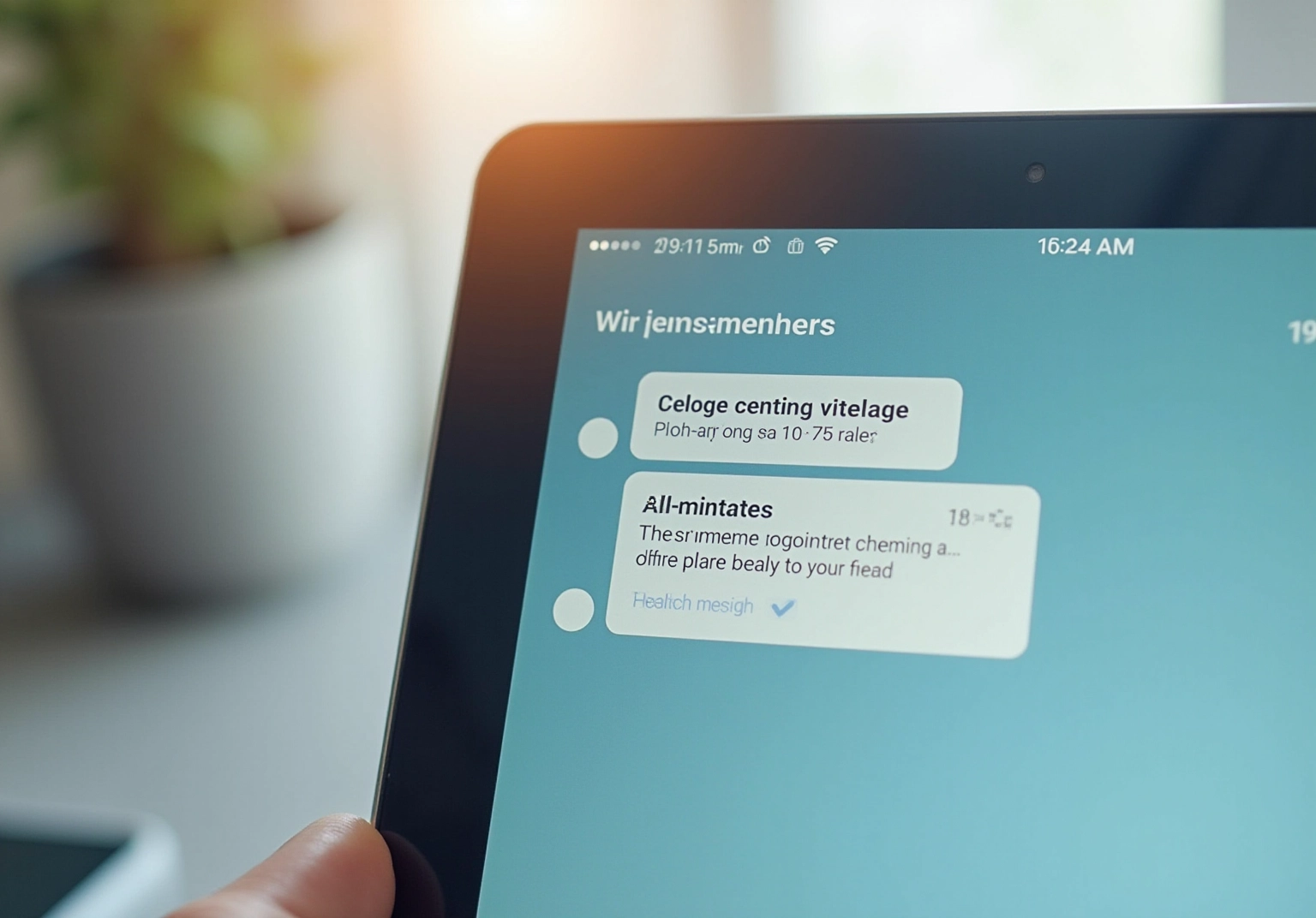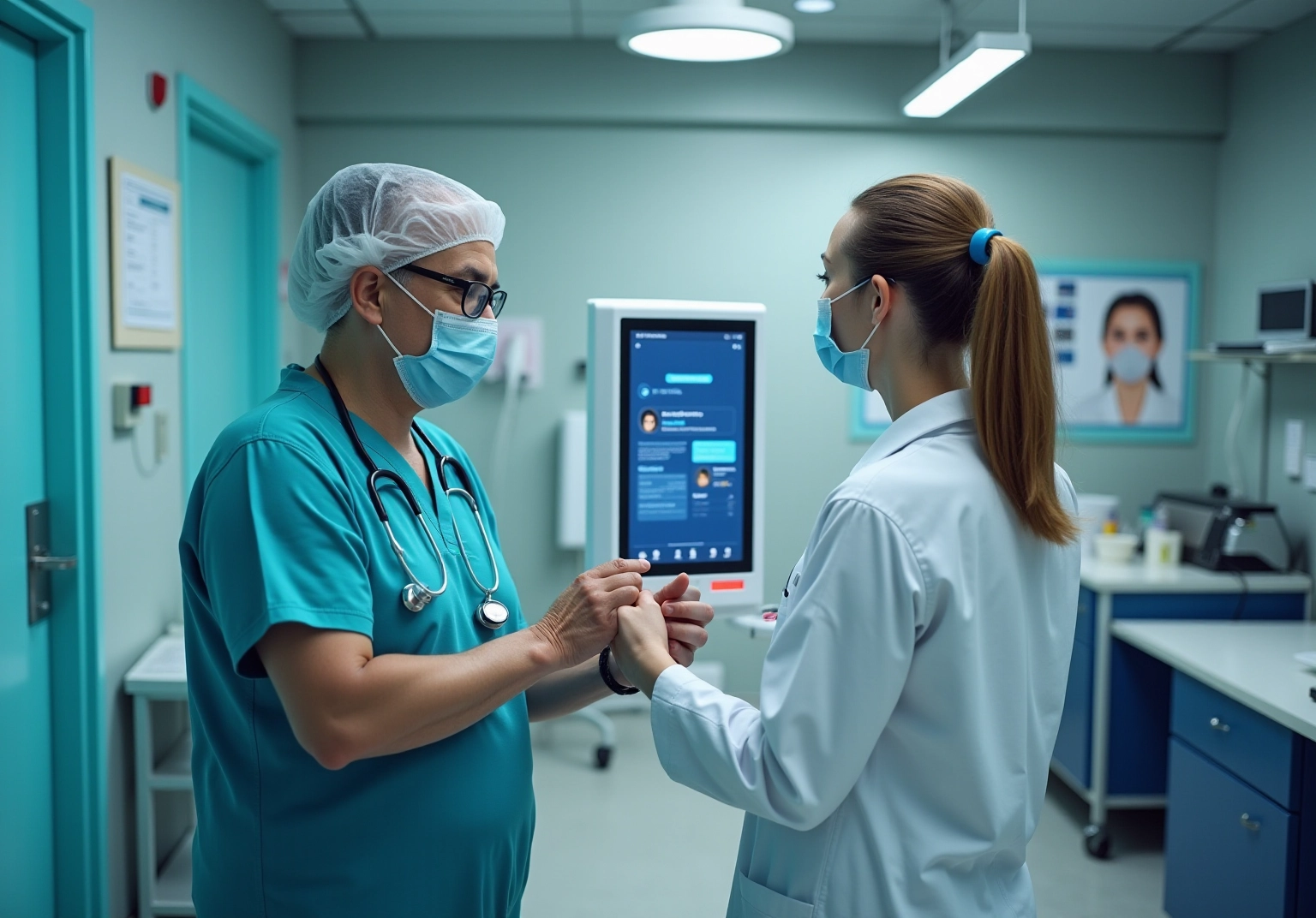
The article “10 AI Use Cases in Healthcare Transforming Patient Care” highlights the significant impact of artificial intelligence in revolutionizing healthcare practices to enhance patient outcomes. It presents a range of applications, including:
These technologies not only improve diagnostic accuracy but also streamline administrative tasks and facilitate personalized treatment plans. Ultimately, this leads to more effective and efficient patient care, underscoring the necessity of integrating AI solutions in modern healthcare.
In the rapidly evolving landscape of healthcare, artificial intelligence (AI) emerges as a transformative force, reshaping patient care and administrative efficiency. Healthcare providers face the complexities of coding, diagnostics, and treatment personalization; AI-powered tools present innovative solutions that enhance accuracy, streamline processes, and ultimately improve patient outcomes. This article explores the various applications of AI in healthcare, emphasizing its critical role in:
By examining the profound impact of AI technologies, it becomes clear that the future of healthcare transcends advanced algorithms; it is about creating a more responsive, patient-centered system that effectively meets the needs of both providers and patients alike.
The Inferscience HCC Assistant harnesses advanced AI algorithms to automate the gathering and examination of clinical data, delivering real-time coding recommendations to medical providers. This innovative tool significantly streamlines the HCC coding process, enhancing accuracy and ensuring compliance with Medicare Advantage requirements. By seamlessly integrating with electronic health records (EHRs), the HCC Assistant alleviates the administrative burden on healthcare personnel, enabling them to concentrate more on care delivery while effectively optimizing Risk Adjustment Factor (RAF) scores.
Statistics indicate that there are over 9,500 ICD-10 codes corresponding to more than 80 HCC codes within the risk adjustment model, highlighting the complexity of accurate coding. Advanced risk adjustment software, such as the HCC Assistant, has been shown to reduce audit risks and improve risk scores, ultimately leading to enhanced financial performance and better outcomes for individuals, which are prime examples of AI use cases in healthcare. Healthcare providers have reported substantial benefits from adopting AI-driven coding tools, with testimonials underscoring improvements in efficiency and accuracy. The HCC Assistant not only simplifies the coding process but also bolsters compliance, making it an indispensable asset for organizations striving to enhance their coding practices and maximize reimbursements.
The implementation of AI use cases in healthcare, especially deep learning algorithms in medical imaging, is fundamentally transforming radiological practices. These advanced tools can process extensive imaging datasets, uncovering patterns and anomalies that might elude human detection. Recent advancements have demonstrated that models like ResNet50V2 achieved an impressive accuracy of 97.79%, an F1-score of 97.78%, and an AUC of 97.84% in COVID-19 classification. This underscores the potential of AI use cases in healthcare to identify early disease indicators, including cancer.
This notable enhancement in diagnostic accuracy not only improves outcomes for individuals but also streamlines workflows within radiology departments. It enables faster image analysis and decreases response times for inquiries by as much as 50%. As the field advances, the incorporation of AI use cases in healthcare, especially in medical imaging, continues to evolve, with ongoing research promoting diverse groups and complex scenarios to guarantee the generalizability of AI performance.
Radiologists are increasingly acknowledging the importance of these diagnostic tools, which promise to enhance the quality of service in 2025 and beyond. As noted by a leading radiologist, ‘AI is not just a tool; it’s becoming an essential partner in our diagnostic processes.’ This perspective highlights the growing trust in AI technologies, particularly in the context of AI use cases in healthcare, which are set to redefine the landscape of medical imaging.
Predictive analytics in medicine leverages historical data and machine learning algorithms to anticipate outcomes for individuals while identifying at-risk groups. By analyzing trends and patterns, medical providers can implement proactive interventions, including personalized plans and early treatment strategies. For instance, a study on hospital readmission prediction models demonstrated that machine learning techniques significantly improved prediction accuracy, achieving an AUC of 0.83 compared to the conventional LACE model’s AUC of 0.66. This advancement enables healthcare workers to efficiently recognize high-risk individuals, allowing for focused follow-up support that enhances health outcomes and reduces costs.
The implementation of predictive analytics has yielded significant results in lowering hospital readmission rates. A comprehensive transition intervention program successfully decreased 90-day readmission rates from 22.5% to 16.7%, resulting in cost savings of $500 per case. Such statistics underscore the critical role of predictive analytics in optimizing healthcare delivery and resource allocation.
As we approach 2025, the integration of predictive analytics tools within health systems is vital for improving individual outcomes. These tools empower medical teams to make informed decisions grounded in data-driven insights. The ongoing evolution of AI use cases in healthcare continues to pave the way for innovative solutions that enhance care and operational efficiency. Inferscience’s AI-powered solutions for HCC coding and risk adjustment are pivotal in this transformation, ensuring accurate data integration that maximizes Medicare reimbursements. As Sacha Davis noted, “Research was conducted in a manner adhering to all relevant guidelines and regulations,” highlighting the importance of rigorous methodologies in developing predictive models. Furthermore, tools for readmission risk reduction must be fully integrated into health systems to maximize their effectiveness, leveraging analytics teams to provide actionable insights.
Virtual health assistants, powered by AI, are revolutionizing user engagement by providing tailored support and information. These assistants effectively respond to inquiries, schedule appointments, and issue reminders for medication compliance. By offering 24/7 access to medical information, virtual assistants empower individuals to take an active role in their health management, resulting in improved adherence to treatment plans and heightened satisfaction.
As Riken Shah articulates, “My work motto is to assist medical service providers in utilizing technological innovations to make medical services readily available to all involved parties, from providers to individuals receiving care.” This vision aligns with the growing reliance on virtual health assistants, especially as telehealth strategies evolve within the medical sector. Notably, statistics reveal that individuals engage with 98% of text message reminders, underscoring the significance of timely communication in medical care. Furthermore, the integration of AI in support tools has yielded remarkable results; for instance, AI-driven drug discovery has enhanced efficiency by up to 70%, showcasing the broader impact of AI technologies across the medical field.
Looking ahead to 2025, the role of virtual health assistants in engaging individuals is expected to expand significantly, with current usage rates indicating an increasing dependency on these tools. Expert insights suggest that these assistants not only improve interactions with individuals but also facilitate overall medical accessibility, aligning with the objective of making services readily available to all stakeholders. The ongoing advancement of AI in medical services signals a pivotal shift towards more personalized and efficient care for individuals.

AI is fundamentally transforming drug discovery by expediting the identification of potential drug candidates and predicting their efficacy. By leveraging machine learning algorithms, researchers can analyze extensive datasets, including genetic profiles and clinical trial outcomes, to pinpoint promising compounds significantly faster than traditional methodologies. This acceleration diminishes the time and costs associated with bringing new drugs to market while simultaneously increasing the probability of clinical success. Recent advancements in AI have demonstrated a remarkable reduction in drug discovery timelines, with some estimates suggesting a decrease of up to 30% in the overall process. Consequently, individuals receive faster access to groundbreaking treatments, underscoring the essential role of AI in improving medical outcomes.
Furthermore, industry experts emphasize that AI’s ability to simulate millions of potential drug compounds allows for a more targeted approach in therapy development, ultimately leading to more effective treatments for various conditions. The growing financial backing for AI technologies in the pharmaceutical sector is exemplified by Kvertus raising US $130 million in funding, highlighting the increasing investment and interest in AI-driven solutions for drug discovery.

AI use cases in healthcare are revolutionizing chronic illness management and risk adjustment in medicine by facilitating tailored treatment plans that leverage real-time data from individuals. For instance, AI systems continuously evaluate information from wearable devices, enabling medical providers to monitor health metrics and proactively adjust treatment plans. This personalized approach not only enhances patient engagement but also significantly improves health outcomes by ensuring timely interventions that address individual needs.
Moreover, accurate Hierarchical Condition Category (HCC) coding is vital for optimizing risk adjustment factor (RAF) scores. AI, in conjunction with natural language processing (NLP), can streamline these workflows, reducing human error and enhancing the quality of medical data. Notably, 83% of physicians believe that AI can effectively tackle challenges such as administrative overload and burnout, highlighting its potential to enhance the medical experience.
Furthermore, 33% of participants strongly agree that AI will boost satisfaction among individuals, underscoring the positive impact of AI on engagement. However, it is crucial to consider individual comfort levels; research shows that 60% of Americans feel uneasy about their healthcare provider relying on AI.
As we approach 2025, the AI use cases in healthcare, especially in chronic disease management and risk adjustment, are anticipated to become increasingly sophisticated, with real-time data analysis playing a pivotal role in optimizing treatment strategies and enhancing Medicare Advantage funding.
Healthcare providers looking to implement AI should start by identifying specific areas within chronic disease management and risk adjustment where AI can enhance monitoring and engagement.
AI-driven chatbots are revolutionizing medical services by significantly enhancing user interactions and streamlining administrative responsibilities. These intelligent systems excel at managing routine inquiries, assisting with appointment scheduling, and providing medication reminders, thereby allowing medical staff to concentrate on more complex needs. Recent studies reveal that the odds ratio for individuals willing to submit symptoms through an online form stands at 1.34, indicating a growing acceptance of digital interactions within medical environments.
The integration of chatbots not only improves communication but also boosts accessibility, fostering a more efficient medical system. For instance, a case study focused on optimizing client flow management demonstrated that AI can analyze user data alongside hospital resources to enhance operational efficiency. This leads to predictive analytics that anticipate admissions and discharges, thereby refining bed management and increasing emergency department effectiveness through improved triage. As we approach 2025, the trend toward automating administrative tasks with AI continues to gain traction, with medical administrators increasingly recognizing the efficiency offered by chatbots.
Inferscience’s AI-driven medical solutions specifically address the challenges of billing complexity and individual confusion, thereby enhancing information accuracy and administrative efficiency. Expert opinions underscore that these tools not only alleviate the administrative burden but also enrich the overall experience by delivering timely information and support. The ongoing advancement of AI chatbots in medical contexts underscores their vital role in transforming client care and operational effectiveness, particularly in relation to AI use cases in healthcare such as HCC Coding and Clinical Insights.

The use of AI in healthcare is revolutionizing telemedicine by significantly enhancing diagnostic capabilities and optimizing healthcare management. Advanced AI algorithms meticulously analyze individual data in real-time during virtual consultations, highlighting important AI use cases in healthcare that equip healthcare providers with essential insights to inform clinical decisions. This functionality not only simplifies the diagnostic process but also improves the accuracy of evaluations, particularly in HCC coding, where precise documentation is crucial for effective risk adjustment and gap management.
Furthermore, AI facilitates efficient remote monitoring of individuals’ health conditions, enabling timely interventions that can reduce the necessity for in-person appointments. As a result, the integration of AI in telemedicine broadens access to care and elevates the overall quality of medical delivery. With the population of individuals aged 80 and above projected to triple by 2050, reaching 426 million, the demand for effective remote healthcare management solutions is more pressing than ever.
The American Medical Association (AMA) has recognized this shift, developing advocacy principles that address the oversight and transparency of AI in medicine, ensuring that innovations align with safety and data privacy standards. Real-world examples illustrate how AI use cases in healthcare are enhancing remote patient management, with telehealth providers reporting improved patient outcomes and satisfaction through AI integration.
As we advance toward 2025, developments in AI within telemedicine are set to reshape the landscape of medical services, rendering it more responsive and patient-centered while also addressing the challenges of incomplete and inaccurate documentation in HCC coding.

AI-driven administrative workflow automation is fundamentally transforming medical operations, highlighting several AI use cases in healthcare by optimizing processes such as billing, scheduling, and documentation. By automating repetitive tasks, medical organizations can significantly reduce human error and enable staff to focus more on care for individuals. For instance, AI technologies can streamline the management of electronic health records (EHRs) by automatically updating patient information and identifying discrepancies. This not only ensures compliance with regulatory standards but also enhances overall operational efficiency.
Current trends indicate that 64% of clinicians in regions like South America and Asia Pacific anticipate that AI will influence the majority of their decision-making within the next decade. This shift underscores the growing reliance on AI use cases in healthcare to enhance administrative workflows. Furthermore, medical organizations are increasingly acknowledging the efficiency gains from AI use cases in healthcare, with many reporting substantial improvements in operational performance. As a testament to this trend, Inferscience’s dedication to information security, highlighted by their SOC2 Type II certification, reinforces their role as a reliable partner in the medical sector, enhancing client confidence in AI use cases in healthcare. Expert views highlight that the incorporation of AI into administrative processes not only streamlines operations but also promotes a more efficient medical environment, ultimately benefiting both providers and individuals.

AI use cases in healthcare are revolutionizing personalized medicine by leveraging extensive individual information, including genetic profiles, lifestyle choices, and comprehensive medical histories, to develop tailored treatment plans. This data-driven strategy empowers medical providers to identify therapies that are more likely to yield positive outcomes for specific patients, thereby enhancing treatment efficacy and minimizing the risk of adverse effects. Indeed, research indicates that 39% of Americans are comfortable with AI use cases in healthcare, reflecting a growing confidence in technology’s ability to improve health results.
The AI use cases in healthcare, particularly in personalized medicine, not only enhance the precision of medical interventions but also align with contemporary trends in data analysis, underscoring the importance of customizing treatments to individual needs. For example, AI-powered drug discovery has shown the potential to expedite the development of new medications, reducing time to market by up to 50% and decreasing research and development costs by as much as 70%. This drives pharmaceutical companies to adopt AI-based platforms, fostering partnerships with biotech firms and research organizations to stimulate innovation.
Furthermore, Inferscience’s AI-driven tools enhance HCC coding and risk adjustment, which are critical for improving medical outcomes. Robust EHR integration is essential for the successful implementation of AI tools in practice, with 84% of physicians identifying it as a top priority. As we approach 2025, the influence of AI on personalized medicine continues to grow, with clinicians in regions like South America and Asia Pacific expressing optimism about its potential.
Expert insights suggest that the coming years will be pivotal in determining how effectively AI can enhance tailored treatment plans, ultimately leading to improved patient care and outcomes. Real-world examples of AI use cases in healthcare, particularly in personalized medicine, further illustrate its effectiveness, showcasing how data analysis can yield more precise and impactful medical solutions. As the Keragon Team stated, ‘The next few years will be crucial in answering that,’ referring to the ongoing evolution and integration of AI in healthcare.
The integration of artificial intelligence in healthcare transcends mere trend; it heralds a significant transformation in the approach to patient care and operational efficiency. Advancements in HCC coding, exemplified by tools like the Inferscience HCC Assistant, alongside revolutionary capabilities in medical imaging, predictive analytics, and chronic disease management, underscore AI’s undeniable potential to enhance accuracy and streamline processes. Each application discussed highlights AI’s pivotal role in reshaping the healthcare landscape, fostering a shift towards more personalized, efficient, and responsive care.
As healthcare providers increasingly adopt AI technologies—from virtual health assistants to AI-driven drug discovery—the benefits become increasingly evident. Enhanced patient engagement, improved diagnostic accuracy, and optimized treatment plans exemplify the transformative power of these innovations. The ongoing evolution of AI across various domains, including telemedicine and administrative workflow automation, is poised to redefine operational frameworks, ultimately culminating in better patient outcomes and a more effective healthcare system.
Looking ahead, the future of healthcare is intricately linked with advancements in AI. As the industry continues to embrace these technologies, a more patient-centered approach is emerging, ensuring that healthcare systems not only address the needs of providers but also prioritize the experiences and outcomes of patients. The commitment to leveraging AI for improved healthcare solutions is not merely a goal; it is a necessity for cultivating a more responsive, efficient, and equitable healthcare environment.